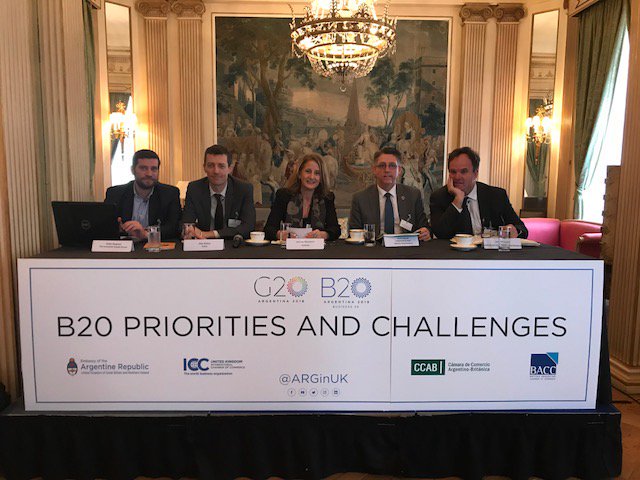CGF Social Sustainability Director, Didier Bergeret speaks at “B20 Priorities and Challenges” seminar at Argentinian Embassy, London.
The Consumer Goods Forum (CGF) was pleased to participate in “B20 Priorities and Challenges”, a seminar hosted by the Ambassador of the Argentine Republic in London. Marcela Manubens from Unilever coordinated and facilitated the panel on social sustainability which Didier Bergeret, the CGF’s Social Sustainability Director took part in, alongside Kevin Hyland, the UK’s Independent Anti-Slavery Commissioner; John Morrison, Chief Executive of Institute for Human Rights and Business and Giles Bolton, Tesco’s Responsible Sourcing Director.
The purpose of the panel was to provide input to B20 on various issues focused on eradication of forced labour as part of the responsible and sustainable employment and growth agenda. As Marcela Manubens said, “there cannot be responsible and sustainable growth whilst there is forced labour and human trafficking”.

During the panel discussion, Kevin Hyland spoke about why the B20 must have anti-slavery measures high on its agenda. 16 million of the 40.3 million people in modern slavery around the world are working in forced labour in the private sector. Therefore, businesses must unite their voices if we are to tackle this issue. Didier went on to praise the actions of the UK government, saying “The UK is one of the key governments raising awareness of forced labour and how it can be tackled.” Didier asked that governmental and business leaders join forces to issue a global call against forced labour during Argentina’s G20 presidency. Leaders must collectively implement policies and processes that incorporate the CGF’s Priority Industry Principles and support the ILO Protocol 2014 on Forced Labour. John Morrison explained how poor workers and their families are having to buy their own jobs – creating debts which can last for years, and opening workers up to all forms of exploitation. The practice of worker fees (illegal but still endured in many countries) can end if the G20 Governments make a commitment to eliminate all forms of worker fees. Finally, Giles Bolton reminded attendees that solutions to these issues must be scalable and the critical role that Governments play, as businesses are not regulators in themselves.
Marcela Manubens ended the panel by summarising the group’s asks for the G20/B20:
- Ratify and promote the ILO Protocol on Forced Labour and taking national action as a result.
- Eliminate all forms of worker fees and to ensure that employers bear the full cost of recruitment
- Put in place mechanisms to prevent the withholding of ID documentation and make it an offence to retain workers’ ID and documentation.
- Join forces to issue a global call against forced labour during the Argentinian presidency
- Effectively implement policies and processes that help mainstream the simple 3 principles (Employer’s pay; freedom of movement and no coercion)
- Apply these principles to public procurement
- Implement Government to Government regulations that protect migrant labour and prevent abusive working conditions.
- Expand opportunities for women’s inclusion and active participation in the G20/B20 process
The seminar was sponsored by the Argentinian Ambassador Carlos Sersale, with the distinguished participation of Dr. Daniel Funes de Rioja, Chair of Business 20, as the keynote speaker. Business 20 represents the private sector’s voice of the G20 community and plays a vital role by providing practical perspectives on the G20 interests and generating new ideas on key topics.
The Consumer Goods Forum was pleased to have been invited to attend this important event, which provided a forum for UK business leaders to speak about the priorities and challenges that need to be addressed under the G20 umbrella. We welcome opportunities such as this one to engage in important discussions with other key stakeholders on the topic of forced labour. Only through collaboration, can we eradicate all forms of forced labour around the globe.
